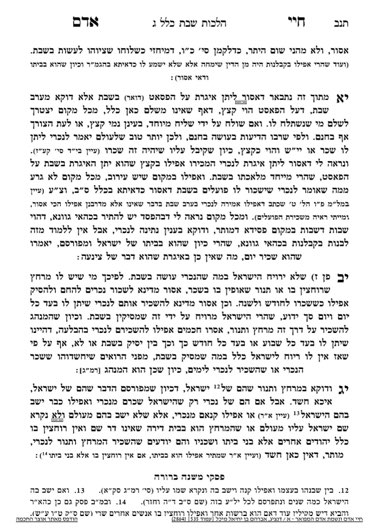We are continuing in siman 11, discussing mail on Shabbos. We have discussed sending and receiving mail on Shabbos; today we will clarify a point regarding receiving mail.
We learned yesterday that if mail was sent to a Jewish recipient by someone else, the Jewish recipient may benefit from it. However, we must clarify that if the sender was Jewish, he cannot have intended that it arrive on Shabbos. If the Jewish sender specifically intended for the item to arrive on Shabbos (if he was not religious, etc.), there is concern that the sender will make such an arrangement again, so there are poskim who hold this case is assur.
In siman 12, the Chayei Adam introduces the seventh criterion for it to be permitted to make an arrangement with a non-Jew before Shabbos regarding melacha on Shabbos. The Chayei Adam writes that the Jew cannot gain any economic benefit from the work which the non-Jew is doing on Shabbos. The Chayei Adam gives an example of one who owns a bathhouse, and wants to give over the bathhouse to a non-Jew for Shabbos. The non-Jew is a kablan, and will be paid a fixed amount, so normally this arrangement will be muttar. However, over here, if the non-Jew is being paid a fixed salary, it means that any profits accrued from the bathhouse being open are going directly to the Jew. If so, the Jew is benefitting from the work of the non-Jew, and it is assur. The Mishnah Berurah points out that this is not an issue of maris ayin, but of the fact that the work of the non-Jew is being tied back directly to the Jew.
The proper muttar setup would be if the non-Jew rents the property from the Jew, pays a fixed price for the rental, and takes all of the profits. The Jew does not benefit from the work of the non-Jew, because his profits are not tied to the work of the non-Jew. However, we would still have an issue of chashad, because people may think the non-Jew is working for the Jew.
Another example of this halacha is a Jew who owns a taxi, and a non-Jew wishes to use the taxi on Shabbos, the Jew can charge the non-Jew a flat fee and the non-Jew keeps all of the profits. Another example would be a Jewish-owned rental company. However, there are still some other concerns which need to be addressed, which we will discuss in the next shiur, be’ezras Hashem.
Summary
-
Regarding mail, items which come from outside of the techum can be handled (i.e, moved) within a reshus hayachid, but one cannot benefit from its contents. If someone else ordered the items be brought, the recipient can even benefit from the contents, provided that a Jew did not send it purposely to arrive on Shabbos.
if one instructs a non-Jew before Shabbos, there are times when it will be muttar, depending on eight conditions.
The seventh condition is that the Jew cannot gain any economic benefit from the non-Jew working on Shabbos. Thus, for example, if the Jew rents something to the non-Jew, the Jew must be paid a flat fee and all profits must go to the non-Jew.



